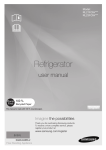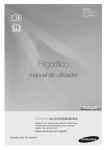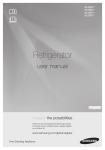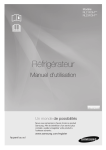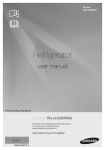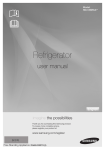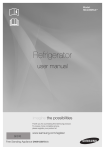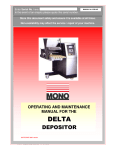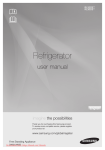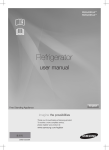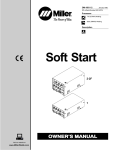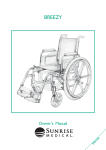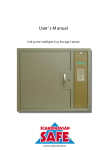Download Samsung RL23FCIH User Manual
Transcript
Model:
RL21FCIH***
RL23FCIH***
Refrigerator
user manual
English
Free Standing Appliance
Imagine the possibilities
Thank you for purchasing Samsung products.
To receive a more complete service, please
register your product at
Http://www.samsung.com/cn
条形码
DA68-02485F-7
Features of your new refrigerator
KEY FEATURES OF YOUR NEW REFRIGERATOR
Your Samsung Refrigerator comes equipped with many space-saving, innovative storage and energy-efficient
features.
• Mechanical type
Built-in thermal head ensures more precise control of the temperature within the refrigerator.
• CFC-free environment-friendly
Environment-friendly, green products.
• Reliable performance
Using famous brand totally enclosed high efficient compressor, with excellent performance and
high reliability.
• Reasonable structure
The layout of refrigerating in the upper part and freezing in the lower part can reduce the loss
of refrigerating capacity and save power; the more frequently used refrigerating compartment
is in the upper part of the refrigerator so that it is easy to access.
The position of the refrigerating compartment shelf can be adjusted according to the size of
the container.
• No taint of odor
The freezing compartment is a drawer structure, which eliminates the odor taint of food,
ensures convenient storage, and maintains the nutrition and original flavor of food.
• Flat-back type
Built-in condenser, which is easy to be cleaned.
CE Notice
This product has been determined to be in compliance with the Low Voltage Directive
(2006/95/EC), the Electromagnetic Compatibility Directive (2004/108/EC) and the EcoDesign Directive(2009/125/EC) implemented by Regulation (EC) No 643/2009 of the
European Union.
For easy future reference, write the model
and serial number down. You will find your
model number and serial number on the
left side of the refrigerator.
02_Features
Model # Serial # Safety information
SATETY INFORMATION
WARNING
WARNING
•Before operating the appliance, please read this manual thoroughly and
retain it for your reference.
•Because these following operating instructions cover various models, the
characteristics of your refrigerator may differ slightly from those described
in this manual.
CAUTION/WARNING SYMBOLS USED
WARNING
Indicates that a danger of death or serious injury exists.
Indicates that a risk of personal injury or material damage exists.
WARNING
OTHER SYMBOLS USED
Represents something you must NOT do.
Represents something you must NOT disassemble.
Represents something you must NOT touch.
Represents something you must follow.
Indicates that you must disconnect the power plug from the socket.
Represents a ground is needed to prevent electric shock.
It is recommended that this symbol be handled by service man.
Please follow up specifically as these war ning symbols are purposed to prevent
you and the others from being injured.
After reading this section, please keep it properly for future reference.
• This refrigerator must be properly located in accordance with the manual before it is used.
• Use this appliance only for its intended purpose as described in this instruction manual.
• We strongly recommend that any servicing be performed by a qualified individua.R600a or R134a
can be used as a refrigerant. Check the compressor label on the rear of the appliance and the
rating label inside the fridge to see which refrigerant is used for the refrigerator.
• In case of R600a refrigerant, this gas is natural gas with high environmental compatibility that
is, however, also combustible. When transporting and installing the appliance, care should
be taken to ensure that no parts of the refrigerating circuit are damaged.
• Refrigerant squirting out of the pipes could ignite or cause an eye injury. If leak is detected,
avoid any naked flames or potential sources of ignition and air the room in which the
appliance is standing for several minutes.
Safety information_03
Safety information
• In order to avoid the creation of a flammable gas-air mixture if a leak in the refrigerating circuit
WARNING
occurs, the size of the room in which the appliance may be sited depends on the amount of
refrigerant used.
• Never start up an appliance showing any signs of damage. If in doubt, consult your dealer. The
room must be 1m3 in size for every 8g of R600a refrigerant inside the appliance.
• The amount of refrigerant in your particular appliance is shown on the identification plate inside the
appliance.
• Please dispose of the packaging material for this product in an environmentally friendly manner.
• Pull the power plug out of the socket before changing the interior light of the refrigerator.
_ Otherwise, there is a risk of electric shock.
SEVERE WARNING SIGNS
• Do not install the refrigerator in a damp place or place where it may come in contact with water.
WARNING
• Deteriorated insulation of electrical parts may cause an electric shock or fire.
• Do not place this refrigerator in direct sunlight or expose to the heat from stoves, room heaters or
other appliance.
• Allow sufficient space to install the refrigerator on a flat surface. -If your refrigerator is not level, the
internal cooling system may not work correctly.
• Do not plug several appliances into the same multiple power board. The refrigerator should always
be plugged into its own individual electrical which has a voltage rating that matched the rating
plate.
– This provides the best performance and also prevents overloading house wiring circuits, which
could cause a fire hazard from overheated wires.
• Never unplug your refrigerator by pulling on the power cord. Always grip plug firmly and pull straight
out from the outlet.
– Damage to the cord may cause a short-circuit, fire and/or electric shock.
• Make sure that the power plug is not squashed or damaged by the back of the refrigerator.
• Do not bend the power cord excessively or place heavy articles on it.
– This constitutes a fire hazard.
• Have the power cord repaired or replaced immediately by the manufacturer or its service agent if
power cord has become frayed or damaged.
• Do not use a cord that shows cracks or abrasion damage along its length or at either end. If the
power cord is damaged, have it replaced immediately by the manufacturer or its service agent.
• When moving the refrigerator, be careful not to roll over or damage the power cord.
• Do not insert the power plug with wet hands.
• Unplug the refrigerator before cleaning and making repairs.
• Do not use a wet or damp cloth when cleaning the plug.
• Remove any foreign matter or dust from the power plug pins.
– Otherwise there is a risk of fire.
• If the refrigerator is disconnected from the power supply, you should wait for at least ten minutes
before plugging it back.
• If the wall socket is loose, do not insert the power plug.
– There is a risk of electric shock or fire.
• The appliance must be positioned so that the plug is accessible after installation.
04_Safety information
• The refrigerator must be grounded.
– You must ground the refrigerator to prevent any power leakages or electric shocks caused
by current leakage from the refrigerator.
• Never use gas pipes, telephone lines or other potential lightening rods as ground.
– Improper use of the ground plug can result in electric shock.
• Do not dissemble or repair the refrigerator by yourself.
– You run risk of causing a fire, malfunction and/or personal injury.
• If you smell pharmaceutical or smoke, pull out power plug immediately and contact your Samsung
electronics service center.
• Keep ventilation openings, in the appliance enclosure or in the built-in structure, clear of
obstruction.
• Do not use mechanical devices or other means to accelerate the defrosting process, other than
those recommended by the manufacturer.
• Do not damage the refrigerant circuit.
• Do not use electrical appliances inside the food storage compartments of the appliance, unless
they are of the type recommended by the manufactruer.
• Before changing the interior light, unplug the appliance from the power supply.
• If you experience difficulty when changing the light, contact your service center.
• The appliance is not intended for use by persons(including children) with reduced physical,
sensory or mental capabilities, or lack of experience and knowledge, unless they have been given
supervision or instruction concer ning use of the appliance by a person responsible for their safety.
• Children should be supervised to ensure that they do not play with the appliance.
• If the supply cord is damaged, it must be replaced by the manufacurer, it, s service agent or
similarly qualified persons in order to avoid a hazard.
• Do not let children hang on the door. If not, a serious injury may occur.
• Do not touch the inside walls of the freezer or products stored in the freezer with wet hands.
– This may cause frostbite.
• If the refrigerator is not to be used for a long period of time, pull out the power plug.
– Deterioration in the insulation may cause fire.
• Do not store articles on the top of the appliance.
– When you open or close the door, the articles may fall and cause personal injury and/or material
damage.
CAUTION SIGNS
• This product is intended only for the storage of food in a domestic environment.
CAUTION
• Manufacturer's recommended storage times should be adhered to. Refer to relevant instructions.
• Bottle should be stored tightly together so that they do not fall out.
• Do not overfill the refrigerator with food.
– When you open the door, an item may fall out and cause personal injury or material damage.
• Do not put bottles or glass containers in the freezer.
– When the contents freeze, the glass may break and cause personal injury.
• Do not spray inflammable gas near the refrigerator.
– There is a risk of explosion or fire.
• Do not directly spray water inside or outside the refrigerator.
– There is a risk of fire or electric shock.
• Do not apply strong shock or excessive force onto the surface of glass.
– Broken glass may result in a personal injury and/or property damage.
Safetyinformation_05
Safety information
• Do not store volatile or flammable substances in the refrigerator.
– The storage of benzene, thinner, alcohol, ether, LP gas and other such products may cause
explosions.
• Do not re-freeze frozen foods that have thawed completely.
• Do not store pharmaceuticals products, scientific materials or temperature-sensitive products in
the refrigerator.
– Products that require strict temperature controls must not be stored in the refrigerator.
• Do not put a container filled with water on the refrigerator.
– If spilled, there is a risk of fire or electric shock.
CAUTION SIGNS FOR CLEANING
• Do not insert your hands into the bottom area under the appliance.
– Any sharp edges may cause personal injury.
• Never put fingers or other objects into the dispenser hole.
– It may cause personal injury or material damage.
• If the refrigerator is disconnected from the power supply, you should wait for atleast five minutes
before plugging it back.
WARNING SIGNS FOR DISPOSAL
• When disposing of this or other refrigerator/s, remove the door/door seals, doorlatch so that
small children or animals cannot become trapped inside.
• Leave the shelves in place so that children may not easily climb inside. R600a or R134a is used
as a refrigerant. Check the cimpressor label on the rear ofthe appliance or the rating label inside
the fridge to see which refrigerant is used for your refrigerator. When this product contains
flammable gas(Refrigerant R600a)contact your local authority in regard to safe disposal of this
product.
• Cyclopentane is used as a insulation blowing gas. The gases in insulation material require
special disposal procedure. Please contact your local authorities in regard to the environmentally
safe disposal of this product. Ensure that none of the pipes on the back of the appliances are
damaged prior to disposal. The pipes shall be broke in the open space.
CAUTION
In the event of a power failure, call the local office of your Electricity Company and ask how long it is
going to last.
Most power failures that are corrected in an hour or two will not affect your refrigerator temperatures.
However, you should minimize the number of door openings while the power is off.
But should the power failure last more than 24hours, remove all frozen food.
For doors or lids fitted with locks and keys, the keys be kept out of the reach of children and not in
the vicinity of the refrigerating appliance, in order to prevent children from being locked inside.
CAUTION
There is protective film on the surface of some refrigerator models, which is used to protect the
refrigerator from scratches during transport. To avoid static electricity, please peel off the
protective film slowly. If the protective film is not removed for a long time, it may cause
color shading of the steel plate.
06_Safety information
Safety information
ADDITIONAL TIPS FOR PROPER USAGE
• Allow the appliance to stand for 2 hours after installation.
• To get best performance of product,
- Do not place foods too closely in front of the vents at the rear of the appliance as it can
obstruct free air circulation in the freezer compartment.
- Wrap the food up properly or place it in airtight containers before put it into the fridge
freezer
- Do not put any newly introduced food for freezing near to already frozen food. Do not
place carbonated or fizzy drinks in the freezer compartment.
• Please observe maximum storage times and expiry dates of frozen goods.
• There is no need to disconnect the refrigerator from the power supply if you will be away
for less than three weeks. But, remove all the food if you are going away for the three
weeks or more. Unplug the refrigerator and clean it, rinse and dry.
• If the key is provided with refrigerator, the keys should be kept out of the reach of children
and not in the vicinity of the appliance.
• The appliance might not operate consistently (possibility of defrosting of contents or
temperature becoming too warm in the frozen food compartment) when sited for an
extended period of time below the cold end of the range of temperatures for which the
refrigerating appliance is designed.
• Do not store food which goes bad easily at low temperature, such as bananas, melons.
• Place the ice tray at the originally provided posistion by manufacturer in order to achieve
optimal ice-freezing.
• Your appliance is frost free, which means there is no need to manually defrost your
appliance, as this will be carried out automatically.
• Temperature rising during the defrost can comply with ISO requirement. But If you want to
prevent an undue rise in the temperature of the frozen food whiledefrosting the appliance,
please wrap the frozen food in several layers of paper such as newspaper.
• Any increase in temperature of frozen food during defrosting can shorten its storage life.
• The appliance is intended to be used in household and similar applications such as
– staff kitchen areas in shops, offices and other working environments;
– farm houses and by clients in hotels, motels and other residential type environments;
– bed and breakfast type environments;
– catering and similar non-retail applications.
Safety information_07
Contents
Setting up your refrigerator
09 Installing the refrigerator
Operating your refrigerator
11 Preparation before operation
09
11
11 Temperature control
12 View of your refrigerator
13 Storing food
14 Maintaining and cleaning
14 Accessories disassembly
15 Replacing the light bulb
Troubleshooting
16
08_Contents
Setting up your refrigerator
INSTALLING THE REFRIGERATOR
Confirm the size of your home door
*Dimension of the refrigerator
Size (mm)
MODEL
Width
546
ALL MODEL
620
RL21FCIH*
610
RL23FCIH*
1436
RL21FCIH*
1584
RL23FCIH*
Depth
Height
Remove all packaging components, including internal adhesive tape and sponge, etc.
For the first time use, the shelf shall be properly installed; the protrusions on the both sides shall be
embedded in the grooves of the two sides of the inner tank so as to ensure a good position.
Be sure to remove the foam bottom pad when using the refrigerator:
1. If the refrigerator is placed a little uneven, the level of the refrigerator can be adjusted by rotating the
adjuster at the bottom of the refrigerator (rotating to the left is to raise it).
There’s an adjusting hole at the lower part of the adjuster, and adjustment can be conducted by
inserting simple tools such as a screwdriver (see the figure on the right).
To protect the appearance of the two sides, new machines shipped with a protective film attached on
both sides, if the appearance of the machine has been determined as without problems, this film can
be torn off to avoid affecting the aesthetic perception.
The refrigerator shall be placed on a flat and firm ground;
otherwise it will generate noise and vibration.
• Noisewillincreaseifplacedonanunfirmfloor;
• Ifitistobeplacedonthecarpet,pleasepadasolidbase
plate, so as to avoid discoloration due to the heat at the
lower part of the refrigerator or hindering the heat elimination;
• Toensureastablearrangement,theadjustablefootingshall
cling to the ground, and the refrigerator shall tilt backward
slightly, so as to conveniently close the door.
Turn up
Turn down
2. The back and the sides of the refrigerator shall be 55 mm or above away from the wall, and the
top shall be at least 300mm away from the wall.
300 mm or above
1013mm
55 mm or above
120
860mm
Settingup_09
01 SETTING UP
Confirm your home door size to determine whether the refrigerator can pass through your home door.
INSTALLING THE REFRIGERATOR
3.Clean the inside and outside of the refrigerator with a wet cloth
(a small amount of detergent can be added into warm water).
4.Place the refrigerator stably, then power on it after about 1 hour.
After cooling the refrigerator for 2-3 hours, then food can
be stored, and the refrigerator begins to work.
It is recommended to store food after 2-3 hours.
Grounding of the machine
• The machine must be grounded before use.
WARNING
– To prevent the power loss or electric shock caused by the electric leakage of the
machine.
– Do not use gas pipes, telephone lines or other potential lightning rod as grounding
terminal.
• Never use a non-grounded power outlet.
– The ground wire (yellow or green) shall be well connected.
10_Setting up
Operating your refrigerator
PREPARATION BEFORE OPERATION
TEMPERATURE CONTROL
1. Season switch
RL23FC***
RL21FC***
Season
switch
Mid
Temperature
knob
Min
Max
Temperature
knob
Season
switch
2
When the ambient temperature is below 15°C(RL23FC**)/10°C(RL21FC**), the season switch should be turned
on; When the temperature is higher than 15°C(RL23FC**)/10°C(RL21FC**), the season switch should be
turned off.
2. Temperature knob
Refrigerator temperature is adjusted by thermostat knob, the knob arrow points to the stalls printed on the
temperature control box, representing the warm and cold conditions inside the refrigerator ("MAX\MID\MIN").
• The more "MAX" the knob arrow points to, the lower the temperature inside;
• The more "MIN" the knob arrow points to, the higher the temperature inside;
• "Off" means to stop working.
Users may select the thermostat knob position
as needed.
To improve the life and use efficiency of the
refrigerator, it is recommended to adjust
by referring to the table on the right:
Reference stalls
Lean to “MIN”
Lean to “MID”
Lean to “MAX”
Occasion of use
Ambient temperature ≥30°C
Ambient temperature 16~30°C
Ambient temperature ≤16°C
Operating_11
02 OPERATING
After completing the following steps, the refrigerator can be used at ease. If not, please check the power supply situation
and the power source.
For questions or problems, please contact your nearest Samsung service center.
1.Install the shelves and containers removed for the transportation to the correct place (see Page 12).
2.Clean refrigerating compartment, freezing compartment and accessories, and eliminate dust accumulated
during the packaging and shipping process (see Page 14).
3.After the refrigerator is powered on, each time when you open the refrigerator door, the lights inside the
refrigerator will turn on.
4.Set the temperature control to the minimum and wait for an hour, then the refrigerator may be slightly cool.
Meanwhile, the compressor should run smoothly and have gentle hum.
5.When the refrigerator's temperature is low enough, food can be stored.
Please remember, after the refrigerator is started, it will take a few hours to reach proper temperature.
Before powered on, check the voltage range, wires and sockets must be able to withstand current of
10A or above.
VIEW OF YOUR REFRIGERATOR
RL23FCIH*
RL21FCIH*
Thermostat
Thermostat
Lamp cover
Egg tray
Door light switch
Preservation
cabinet shelf
Multi-purpose tray
Vegetable & fruit
drawers cover
Vegetable & fruit
drawers
Bottle guard
Freezer drawer
Lamp cover
Egg tray
Door light switch
Preservation
cabinet shelf
Multi-purpose tray
Vegetable & fruit
drawers cover
Vegetable & fruit
drawers
Bottle guard
Freezer drawer
2
2
To get the best energy efficiency of this product, please leave all selves, drawers and baskets
on their original position like as above illustration.
12_Operating
Accessories
12_Operating
Name
RL21FCIH*/RL23FCIH*
Freezer drawer
3
Preservation cabinet shelf
2
Vegetable & fruit drawers
1
Vegetable & fruit drawers cover
1
Egg tray
1
Bottle guard
1
Multi-purpose tray
1
STORING FOOD
It is recommended to package food with freshness protection
package (film), or cover the food containers with covers, so as to
prevent food drying or odor taint.
02 OPERATING
Hot food and drinks shall be placed in the refrigerator after cooled
to room temperature, so as to save electric energy.
Cooked and raw food should be stored separately.
Food should not be placed too close to each other; there should
be plenty of room to help keep the air circulating.
Food and containers can not be close to the rear panel.
It is better to store the food by cutting it into small pieces.
Washable food such as fruit, vegetables and so on are better to be
stored after cleaned and dried.
Fruit and vegetables should be placed in the fruit and vegetables
compartment to maintain their moisture and freshness.
Tropical fruit such as bananas, pineapple, etc. should not be placed
in the refrigerator for storage;
Items have very strict requirements on temperature can not be
stored, such as serum, vaccine, academic information, etc.
If you need to store large amounts of food, ice making, or rapid
cooling, you can remove the freezing compartment drawer, and
place frozen food directly on the evaporator partition.
Operating_13
Operating your refrigerator
MAINTAINING AND CLEANING
Internal accessories
Remove all the shelves, door frames, baskets, covers, drawers, etc.,
and wipe with a soft cloth dipped in warm water or neutral detergent (for
washing tableware).
After using detergent, you must wipe with water, and then dry with a dry cloth.
Door seals
Door seals contaminated with oil or soy sauce and other fluids are easy
to be damaged over time, especially the lower side door seal of the
upper door is most likely to be contaminated, so it must be carefully
wiped, the groove shall be wiped by a wood chopstick wrapped with
sliver. When embedding the door groove after clean-up, first fix the four
corners, and then embed section by section.
Refrigerator defrosting method
When the frost layer inside the refrigerator is too thick, it may affect the cooling effect of the
refrigerator; at this time, the food inside the refrigerator can be removed, wrapped and placed in a
proper place; unplug the power supply; after the frost melted, wipe the water stain with a dry soft
cloth, plug the power supply to start it, and then set the temperature to run; generally defrost the
freezing compartment once or twice within one year.
1.Before defrosting, the refrigerator power cord must be unplugged; after defrosting, the
freezing compartment shall be thoroughly cleaned;
2. Usually, the most appropriate time for defrosting is when the freezing compartment is
empty or almost empty;
3. Do not use metal or sharp tools for defrosting, so as to avoid damaging the refrigerator;
4. Do not use an electric heater to defrost;
Notes for internal and external cleaning of the refrigerator
• B
efore cleaning, firstly, the power plug must be unplugged from the outlet; the interval between
plugging and unplugging should be longer than 5 minutes;
• When cleaning, do not let water get into the light box;
• Scrub with a soft towel dipped in warm water or neutral detergent, and then wipe with a dry cloth;
• Do not scrub with detergents containing abrasive (like toothpaste), acids, chemical solvents (like
alcohol) or polishing agent;
• To ensure the refrigerator performance, periodically clean it;
Please make the following checks after maintenance:
Check of the power line for cracking or damage;
Check of the power plug for the reliability of plugging into the outlet;
Check of the power plug for abnormal heating, etc.;
ACCESSORIES DISASSEMBLY
1. Refrigerating compartment shelf
– The shelf position can be changed according to the height of the container.
2. Freezing compartment drawer
– Pull out to the block, and it can be removed after the upward tilt.
14_Operating
ACCESSORIES DISASSEMBLY
3. Fruit and vegetable basket and cover
–
Pull out the fruit and vegetable basket, and remove it after the front
part elevated.
02 OPERATING
When removing, do not forcibly pull out to avoid damage to the
refrigerator.
4. Egg rack, multi-purpose rack and large bottle rack
–
They can be removed after the upward elevation.
5. Fruit and vegetable basket
–
Fruit and vegetable basket can maintain the moisture and freshness
of fruit and vegetables, because its closed-form can prevent cold
air from directly contacting with fruit and vegetables.
It is applicable to the storage of vegetables and fruit.
6. Icing box
–
Pour cooled boiled water or drink into the clean icing box and place it
in the freezing compartment.
–
When taking the ice, just twist the icing box, and do not twist up and down.
REPLACING THE LED LAMP
The product uses LED lighting. For replacement, please contact the SAMSUNG
customer care center, and do not replace it by yourself.
Operating_15
Troubleshooting
The refrigerator does
not work, does not
refrigerate
– The plug hasn’t been plugged properly.
– No power, power outlet failure.
–The refrigerator powered off during running, and
powered on again within 5 minutes
The refrigerator is not
cold enough
– The refrigerator door hasn’t been closed properly.
–The refrigerator is next to heat sources or exposed
to direct sunlight.
–Poor ventilation around the refrigerator, and slow
heat elimination.
Long-running of the
refrigerator
–The refrigerator door has been opened too
frequently; the door hasn’t been closed properly.
–Poor ventilation outside the refrigerator, and slow
heat elimination of the refrigerator.
–Place a large amount of food into the refrigerator
at one time; food is stacked too close, affecting air
circulation.
No refrigeration, not cold
enough, too cold
There’s unusual noise in
the refrigerator
The refrigerating
compartment is too
cold, and food is frozen
–The refrigerating temperature is too low, users are
recommended to adjust the temperature to a higher
degree.
–The food stored contacts with the cold source of
the rear wall of the refrigerating compartment.
The refrigerator is not on
a flat place
–If the refrigerator is placed a little uneven, the running
noise will increase; the level of the refrigerator can
be adjusted by rotating the adjuster at the bottom of
the refrigerator
Sound of airflow or
gurgling sound of water
flow
–The temperature inside the refrigerator can be
quickly lowered through the flow of refrigerant in the
pipeline. Refrigerants can be divided into two types,
namely gas and liquid; there may be a slight sound
in the flow process
Slight "hum" sound
–The compressor is working, and the sound is slightly
higher when it just starts. High efficient refrigerator
has a slightly higher sound due to the strong
working of the compressor
"Click", "bubble" sound
–When the refrigerator is powered on or powered
off, the start relay and thermal protector and other
electrical components may suddenly produce "click"
and "bubble" sound due to constant pick-up or
disconnection
Cracking sound or the
"pop" sound
–When the refrigerator is running, due to temperature
changes, food may produce cracking sound or the
evaporator and pipeline may produce "pop" sound
due to expansion on heating and contraction on
cooling
In summer, due to high ambient temperature, the refrigerator eliminates heat slowly, leading to
the working hours of the compressor too long.
Users are recommended to set the refrigerating temperature to "MIN".
In winter, the ambient temperature is low and has a small difference with the temperature
within the refrigerator, and then the refrigerating compartment will not be cold enough, which
is normal.
Users are recommended to set the refrigerating temperature to "MAX".
16_Troubleshooting
Condensation in the center
beam and container frame
Condensation in the fruit
and vegetable basket
– When the door is kept open for a long time.
– Liquid food is stored without adding a cover.
Defrosting water overflows
in the refrigerator
– Water outlet is blocked.
– Use the drain plug or similar tools to clear.
Frosting or freezing of
the internal back of the
refrigerating compartment
–When the refrigerator is running, the
temperature of the refrigerating pipeline at the
internal back of the refrigerator is below 0°C,
then the back will frost or freeze when there’s
too much humidity inside the refrigerator.
–After the refrigerator stops running, the frost
will automatically melt, and condensation and
water drops will appear.
– It is recommended to clean once a month.
–Food and the food containers can not be close
to the rear panel.
The front frame of the
refrigerator or the side plate
are hot
–To prevent water vapor condensation on the
frame of the refrigerator, an anti-condensation
pipe is installed within the frame; the
refrigerator will be hot while running, which is
normal rather than a phenomenon of failure.
–The two sides of the refrigerator are equipped
with heat elimination device (condenser), so the
occurrence of hot of the two sides is normal.
Unusual odor in the
refrigerator
– Strong smelling food should be wrapped tight.
– Check for bad food.
– The refrigerator needs cleaning.
Condensation/water
leakage, frosting/freezing
The two sides are hot,
unusual odor
–It will occur when the environment is very
humid.
– Use a soft cloth to dry it.
The temperature inside the refrigerator is lowered through the compressor operating and
refrigerant circulation and other processes, so as to maintain the freshness and nutrition of
food. When the refrigerator is running, you will hear some slight sounds, which are normal,
please use it with ease.
Troubleshooting_17
Memo
Memo
Ambient Room Temperature Limits
This fridge/freezer is designed to operate in ambient temperatures specified by its temperature class marked
on the rating plate.
Class
Symbol
Ambient Temperature range(°C)
Extended Temperate
SN
+10 to +32
Temperate
N
+16 to +32
Subtropical
ST
+16 to +38
Tropical
T
+16 to +43
NOTE: Internal temperatures may be affected by such factors as the location of the fridge/freezer, ambient
temperature and the frequency with which you open the door. Adjust the temperature as required to
compensate for these factors.
Contact SAMSUNG WORLD WIDE
If you have any questions or comments relating to Samsung products,
please contact the SAMSUNG customer care center.
COUNTRY
AUSTRALIA
CALL
1300 362 603
COLOMBIA
Bogotá 600 12 72
Gratis desde cualquier parte del país 01 8000 112
112 ó desde su celular #SAM(726)
EIRE
0818 717100
HONG KONG
(852) 3698 4698
Web site
www.samsung.com/au/support
www.samsung.com/co/support
www.samsung.com/ie/support
www.samsung.com/hk/support (Chinese)
www.samsung.com/hk_en/support (English)
1800 3000 8282 - Toll Free
1800 266 8282 - Toll Free
9612300300
1800-88-9999
603-77137477 (Overseas contact)
www.samsung.com/in/support
0800 726 786
800-7267
800-0101
www.samsung.com/nz/support
www.samsung.com/latin/support (Spanish)
www.samsung.com/latin_en/support (English)
PHILIPPINES
1-800-10-7267864 [PLDT]
1-800-8-7267864 [Globe landline and Mobile]
02-4222111 [Other landline]
www.samsung.com/ph/support
SINGAPORE
SOUTH AFRICA
UK
VIETNAM
1800-SAMSUNG(726-7864)
0860 SAMSUNG (726 7864)
0330 SAMSUNG (7267864)
1800 588 889
www.samsung.com/sg/support
www.samsung.com/support
www.samsung.com/uk/support
www.samsung.com/vn/support
INDIA
Bangladesh
MALAYSIA
NEW ZEALAND
PANAMA
www.samsung.com/in/support
www.samsung.com/my/support




















